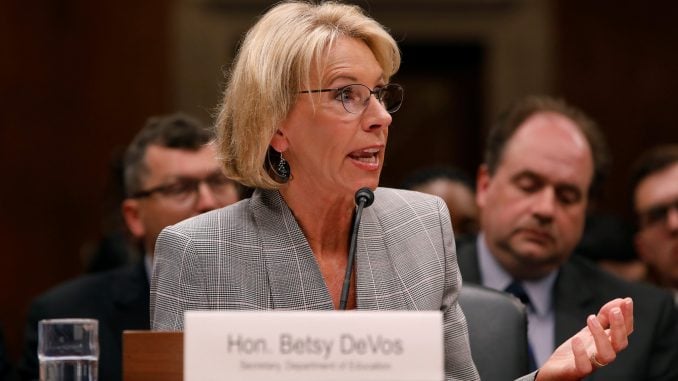
Last week, the Department of Education announced that Adam Kissel will serve as the next deputy assistant secretary for higher education programs. His appointment is welcome news.Kissel, who has worked at the Foundation for Individual Rights in Education (FIRE) and the Koch Foundation, is a vocal opponent on federal overreach in higher education, particularly as it affects students’ due process rights. He has criticized the Office for Civil Rights’s mandate that universities adjudicate sexual assault cases using loosened standards for conviction.That policy is one of many burdensome and unjust regulations affecting the nation’s colleges and universities. Kissel, in his new role, won’t be in a position to decrease universities’ regulatory burden. But his appointment may signal a new direction in the Department of Education.Such a reform is badly needed. In addition to sexual assault, federal bureaucrats now dictate campus policies regarding academics, athletics, technology, employment, campus construction, student health, and even campus dining. Any school that accepts federal funding, including accepting students with federal student loans, must adhere to the policies.Many in Congress have already acknowledged the problem. In 2013, a bipartisan group of U.S. senators created the Task Force on Federal Regulation of Higher Education. In 2015, the Task Force’s official report denounced the “jungle of red tape” produced by the Education Department. The report cited analysis by George Mason’s Mercatus Center showing that federal higher education mandates increased by 56 percent from 1997 to 2012.Despite the Task Force’s indictment of the overregulation of higher education, little has changed. Federal regulations remain, in the words of the Task Force, “unnecessarily voluminous,” “inordinately costly,” and “overly complex.”The Higher Education Compliance Alliance, a membership organization for university compliance officers and organizations, provides a comprehensive list of key federal laws and regulations governing colleges and universities. The list includes 268 statues and more than 1,000 regulations and standards that must be followed each year. The Task Force estimated that these documents comprise “approximately 2,000 pages of text … the Department of Education issues official guidance to amend or clarify its rules at a rate of more than one document per work day.”The volume of the regulations is not the only problem. Individual regulations are also problematic. The rules for verifying student aid eligibility, for example, are extremely convoluted. The current regulations force universities to act as middlemen between the federal government and students when determining the accuracy of families’ financial information on student loan applications.The costs of over-regulation represents a significant portion of university spending. Vanderbilt University estimated in 2013 that the cost of compliance with federal regulations “equate to approximately $11,000 in additional tuition per year.” And a 2015 Boston Consulting Group study of 13 colleges and universities found that federal compliance amounts to between 3 and 11 percent of yearly expenditures (6.4 percent was the median). This is a significant burden on schools and on parents and students who struggle to pay ever-increasing tuition bills.During his campaign, Donald Trump promised regulatory reform. Now, the White House and Education Secretary Betsy DeVos are poised to make changes. In February, Trump issued an executive order directing all federal agencies to set up a “regulatory reform task force” to identify rules for potential elimination. DeVos said in a recent hearing in the U.S House that the department plans to carry out recommendations of the Congressional Task Force on Federal Regulation of Higher Education.Easing the burden of federal regulations on higher education would save universities and students considerable money and time and would restore the vital task of educating future citizens and leaders to local control.Jenna A. Robinson is the president of the James G. Martin Center for Academic Renewal. She lives in Raleigh.



